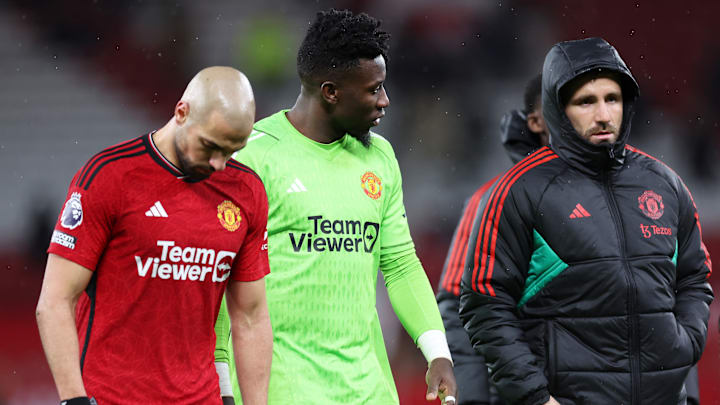Ten Hag’s gamble backfires

A lot of talk in recent months has surrounded the issue over a lack of identity in United’s play, but perhaps that is a criticism that cannot be levelled at the club in their past few matches.
There has been a clear directive by Erik Ten Hag to press more aggressively without the ball and build from the back when they are on the ball. United held the ball and took high risks at times when playing out but there was no doubt they were committed to this philosophy… for better or for worse.
The gameplan was therefore clear. The team selection? Less so.
Eyebrows were raised prior to kick off when the team lineup filtered through that it would be the under fire Anthony Martial starting over Rasmus Hojlund. The Frenchman did little to elicit any support from his fans with the performance he put in as he was largely anonymous and lethargic in his play. His solitary moment worthy of mention was holding up the ball on the left wing before playing Garnacho through but ultimately the move came to nothing.
United fans want their team to play positively and that doesn’t necessarily mean to constantly score goals or produce highlight plays, although they could certainly do with that now. Rather, it could be as simple as playing a pass with purpose, running after a ball as if you are desperate to win it back or attacking a loose ball bravely. At the moment, none of those things are evident in Martial’s performances.
Contrast this to his replacement, Hojlund whose first actions when he came on was to place his body back between the Bournemouth defenders and the ball which drew fouls from the away side allowing his team to at least maintain the ball. Hojlund made constant runs to press Bournemouth’s defence and above all else produced something that Martial does not: urgency. The Dane was unlucky not to have a finish later when Diogo Dalot selfishly chose a shot from a tight angle instead of squaring it which was indicative of the current dysfunction and lack of synergy in the team.
Martial was not the only party guilty on the night of being a passenger and found wanting in his contributions to the team when he doesn’t score as that very same criticism can be levelled at the hero against Chelsea, Scott McTominay.
Fortunately for Martial, he at least has the caveat that he is meant to be judged for his forward play only whilst McTominay, on paper at least, is a midfielder. For all the praise levelled his way for his match winning goals against Brentford and Chelsea, ultimately his contribution metrics should be judged a little further away from goal and McTominay does not offer enough in the middle of the park which results in rippling consequences in defence and attack.
McTominay’s place in the side is in a very strange paradox at the moment in that he offers little to the side apart from one thing but it just so happens that is the most coveted metric in any football match: goals.
It is well documented how uncomfortable on the ball McTominay is which leads to one less available passing option in the middle. This was evidenced by him giving the ball away twice in the first half with one occasion leading to Solanke striking the post and the second chance resulting in Solanke breaking through but failing to find an open teammate.
Off the ball, McTominay attempted to tackle a Bournemouth player just once and went into a challenge once which makes for incredibly dire numbers for a player in his position especially when United are pressing high up the field and run the risk of that press being bypassed in which they rely on their midfield to make tackles, hold up the break or make tactical fouls.
In essence, Ten Hag is basically gambling on United playing with almost one less man in the hope that McTominay scores. The forwards are basically playing as a decoy option to create space for him whilst the other midfielders are trying to work twice as hard to cover for him off the ball.
Whether Ten Hag acknowledges it or not, he is in fact setting up his team around McTominay for goals. The only way McTominay offers anything to the team now is if he scores and if he is not scoring then his contributions are limited and at times almost a net negative when he loses the ball or does not contribute to defending off the ball. Simply put, that is not good enough for a midfielder.
For now, it seems to be a gamble that Ten Hag is willing to make. Perhaps a question the Dutchman needs to ponder is whether a tactic designed around McTominay to score is sustainable and how much this is impacting on the rest of the team.
